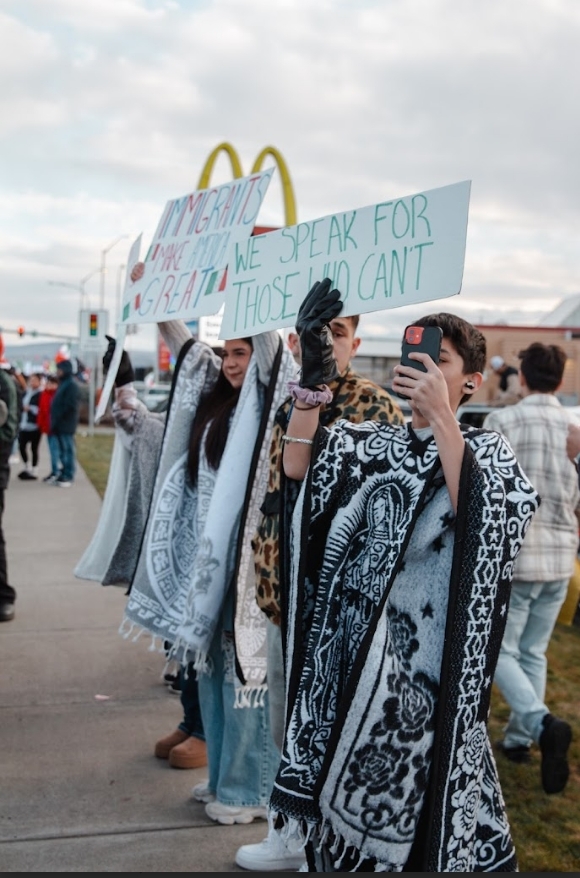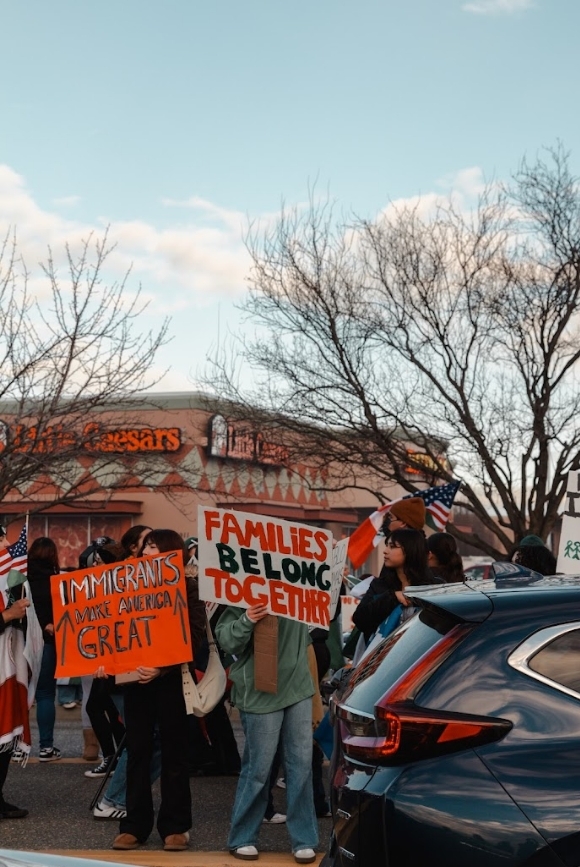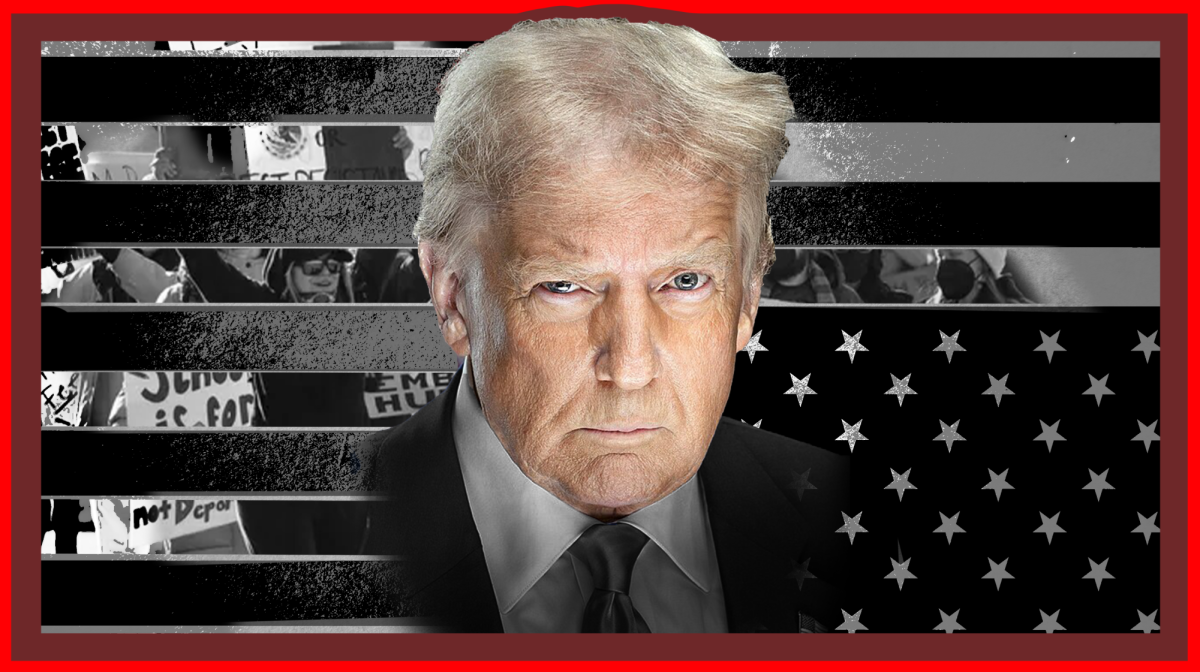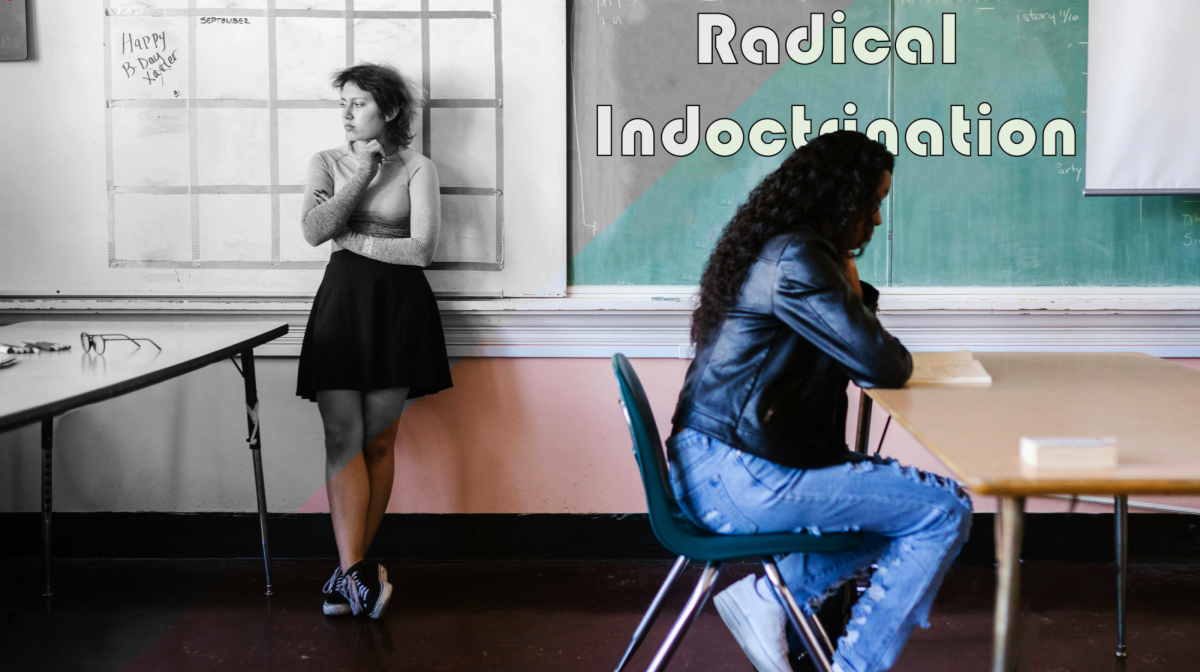Story updated Jan. 6, following the release of an official statement by University Relations.
“For their legal protection, as well as due to the sensitive nature of the story, all students who volunteered their personal experiences have requested and been granted anonymity. Because of this, all student attributions will use a number in place of their name, and majors will not be disclosed. The Observer places a high value on its sources’ safety, and has made this decision in line with The Observer’s ethical code and in respect to source security.”
In the two weeks since Donald Trump was sworn in as president, he has passed executive orders banning birthright citizenship, ramping up immigration raids across the country and sponsoring the deconstruction of any Biden era immigration policy. The effects of his changes have been widespread, and many CWU students have expressed fear and uncertainty for their future.
ICE Raids
A major part of Trump’s recent campaign involved ramping up Immigration and Customs Enforcement (ICE) raids across the country. On the ICE official website, they state their mission, “is to protect the homeland through the arrest and removal of those who undermine the safety of our communities and the integrity of our immigration laws.” However, protests have arisen nationwide due to the recent increase in raids that have taken place, with many claiming the raids tactics are inhumane and unethical.
CWU Student 1, a first-generation American, talked about how their family has been affected by the raids. “The raids have been something that I’ve seen my entire life,” Student 1 said. “I’m thankful that my parents were able to secure their things [get citizenship] as they were able to within the last few years. So some of the fear has died down, but I do have a lot of family members that I’m constantly scared for, just because they have to work 100 times harder than the standard person that is a citizen. And they’re out in the street, and I have a lot of fear that they could get profiled, and they could get harassed, and things can escalate.”
“I’m worried they could be put in a detention center,” Student 1 continued. “Detention centers are known to be really, really inhumane. I have family members that have had to go through detention centers, and the stories make me feel unreal. I’ve had family members that were kicked to the ground like dogs, little kids too. It’s just an overall unreal feeling.”
Even if the ICE raids don’t affect someone personally, the effects of having them in a community can be extreme. Student 2, who was born in the US, shared their experiences surrounding the raids and the burdens the raids have placed on them. “I’ve seen it personally, how it’s been affecting people,” Student 2 said. “I’m close with this family, who are all undocumented, except one of the kids, who is 13 years old, who was born here. They had to reach out to me, because I’m a US citizen, being like, ‘Hey, something happened to us. Can we entrust our kid to you?’ And I’m in college, I’m 20. So it’s nerve-wracking that they have to be put in such a situation where they have to try to plan their future for their kid in the case that they won’t be there. It’s really sad.”
Student 2 also voiced their concerns with ICE’s training methods. “It’s really important to emphasize how ICE is trained specifically because they are trained to look at one’s accent, skin color and those racial profiling aspects,” Student 2 asserted. “That is how they’re trained, and that is what they’re looking for, which is a shame in 2025.”
Student 3 shared a similar fear regarding the ICE raids. “My mom has told me that, like, ‘hey, if something were to ever happen and they deported me, god forbid, you would be in charge of not only your little brother, but also the house we own and the mortgage and everything,’” Student 3 said. “Thankfully, I’m about to graduate, but if that were to happen anytime soon I’m afraid that I would potentially have to drop everything to take care of my family, in place of my mother, and that terrifies me … I wake up every morning and just hope that I don’t get that phone call.”
Local Response
CWU students facing these challenges are not alone. Central Washington Justice For Our Neighbors (CWJFON) is an organization that provides free immigration services for the community. Founded in 2018, they do advocacy work, provide ‘know your rights’ presentations, rapid response training and rapid response resources. This means they verify rumors of ICE or Customs and Border Protection (CBP) in certain locations by having people go out to see if the rumors are true. If the rumors are confirmed, they take photos or videos in an attempt to track ICE in a safe manner.
The work that CWJFON does is unique, especially in Ellensburg, where there are not many providers for immigration legal services.
“Obviously, we are in a very different political landscape than we’ve seen at least in my lifetime, and we know that historically immigration law has never been particularly positive. Pro-immigrant policies are a rarity,” Executive Director of CWJFON Abigail Scholar claimed. “Right now it’s much more open to violations of people’s civil liberties and civil rights because everyone in America, no matter their immigration status, has certain civil rights, and they are being violated … It’s putting people in a rightful place of fear.”
“I think it is important to note, in Yakima, multiple times a day there are ICE sightings and ICE activity. There was a period of about an hour where they were parked outside of a public park and just picking people up nonstop,” Scholar said. “Obviously, if you’re picking up people en masse, claiming that they’re all criminals, or that they are only going after ‘criminal immigrant populations,’ it’s just inaccurate. You simply can’t tell if you’re just randomly picking people up.”

According to Scholar, because of the increase in ICE activity across the country, CWU has consulted CWJFON on ways to protect students.
Scholar urges students, professors and administration who have questions to visit CWJFON’s website at cwjfon.org, which can be read in over 100 different languages. For immediate help, they ask students to report directly to them. “Please come to us,” Scholar said. “That’s why we are here and that’s why organizations like us exist. We’re all here for you and I hope we can support you.”
“It’s happening, you know, when [President Trump] said he was going to make sure that what had previously been considered sensitive locations were no longer going to be sensitive locations, and it’s happening,” Scholar said. “There is no question now that that promise is being seen through.”
One CWU student, Student 3, described how the ICE raids are impacting them and their mother’s lives, with their mother not being an official US citizen. “My own mother does not have legal citizenship, and that is the same with a lot of my family members,” Student 3 said. “The fact that she has to live in fear to even do something as simple as going to the grocery store is ridiculous to me. Personally, I’ve already been seeing it impact my community back home, where there isn’t as much people out and about anymore. The community is very quiet because there’s a blanket of fear, and you can feel it anytime you go outside.”
Birthright Citizenship
Another one of the largest changes Trump has signed into his executive orders is the removal of birthright citizenship, a right explicitly outlined in the Fourteenth Amendment.
Student 3, who has citizenship through the policy of birthright citizenship, talked about how the change could completely uproot their life. “If birthright citizenship were to end and if our birthright citizenship were to be revoked, that would uproot all of our lives, and that strikes a big amount of fear in me,” Student 3 said. “Especially because we were born in America, we were raised in America, we are Mexican American and to suddenly have the American part revoked is such a big blow to our identity.”

“Lessons that were taught to me when I was younger are coming back into play,” Student 3 continued. “Like, don’t open the door to strangers, and people in uniforms are no exception. If we see a police officer at our door, especially a police officer, we don’t open it. And I feel like that’s so backwards, because we should be able to have confidence in people with authority, but it’s something that we’ve had to grow up with, and it’s something that I’m trying my best not to get desensitized to. I want to keep fighting for change on this issue.”
Another CWU student, Student 1, discussed their fears with these new policies. ”I’m not a traditional American, I don’t have the same liberties as a traditional white person because I was born here, but I’m not white,” Student 1 said. “So if we are put in this situation [ending birthright citizenship] then we’re being stripped from the only identity that we’ve only ever known.”
“I even have fear for myself; it has definitely made me carry myself completely differently in the way that I am when I present myself in public,” Student 1 said. “I try to make my body language a lot more approachable and I just can’t do anything wrong. I’m a lot more alert and aware just because I really don’t know who around me has this prejudice and hatred that is being shown in these raids and these efforts to really just take a lot of people out of this country wrongfully.”
Student 2 shared their confusion with Trump’s order to remove birthright citizenship. “I feel like for being president, you kind of have to have a basic understanding of what the constitution means and things you can and can’t do,” Student 2 said. “The fact that he’s going out of his way to do all of these things is just confusing to me.”
Student Resources
In an email sent out by CWU President Jim Wohlpart, CWU detailed its plans to “promote a living, learning, and working environment where everyone is safe and supported” through these new national policies. The email, which was sent out Jan. 28, read, in part: “The safety, inclusion, and belonging of our students and employees is of the utmost importance to the Central Washington University community. Because of recent federal executive action related to national origin and citizenship status, I am writing with important information and resources that our university community may find helpful.”
The email then continued to list online resources, and mental health support for affected students, with the promise that, “In the coming days, CWU will issue a fuller set of guidance and resources about the university’s policies and practices related to national origin and citizenship status.” As of the Observer press time (Feb. 4), no follow-up emails had been sent.
Despite the email, some students still expressed concern with how the university is handling the executive orders. “I find it really interesting that Central kind of prides themselves on being a diverse school,” Student 4, a student at CWU, said. “They use the percentage of Hispanics or people of color that go here as an incentive for others to come here. But other than an email from the President, we haven’t really seen much about resources or what the school’s doing to protect undocumented students or people who have family members, or know somebody.”
Student 3 had one request for how Central could support their students. “I would say for Central to just not cooperate with ice, because that is something they can very much do, and it’s something that they’ve already kind of made a statement about, saying that they are willing to protect students.”
“It’s a big burden, even if it doesn’t directly affect you,” Student 4 said regarding Trump’s new policies. “You can’t really go about your day knowing that some people are never going to see their parents again, you can’t really go about your day knowing that ICE could bust in through the doors in the middle of class and take somebody. I’d love to see more from Central.”
Student 2 also described the stress these raids have caused them. “Can I go on about my day knowing that there are other people who this is their last day seeing their families? No, I think about it constantly,” Student 2 said. “I have empathy for them. I’m at night trying to go to bed, and I wonder what I can do for them because I’m just so privileged that I was born here.”
CWJFON Executive Director Scholar suggested one way CWU could accommodate students who may have had a family member detained or deported. “How do we ensure that their schoolwork or their position in the college isn’t negatively impacted?” Scholar asked. “In the same way that we have family paid leave … let’s put that student’s semester on pause, that way they can jump back into and it and it doesn’t impact their GPA.”
Student 3 shared a hopeful message. “I think us as immigrants should really band together in this situation. I know specifically for Mexican immigrants, and like the Mexican community as a whole and the Hispanic community as a whole, it’s easy for those who have gotten citizenship to kind of start looking down on those who haven’t yet … my hope is that in these struggles, we all unite, and we put aside those differences, and go back to our roots and embrace the fact that we’re Mexican, embrace the fact that we’re a part of this community.”
A CWU student Student 1 said that for them, fear cannot be a limiting factor in their education. “This is the world we’re living in, and we’re just gonna have to get through it, but we can’t let this be a reason why we don’t go to work, we don’t go to school,” Student 1 said. “I’m going to continue to work equally as hard, to honor a lot of the stuff that my family members have done to live a meaningful life here. So yes, I’m scared, but that’s not going to hinder me. I’ll stand in front and I’ll try and protect the people that are behind because fear and having that hinder you can make you unwillingly complacent in what’s going on.”
UNIVERSITY UPDATE:
On Jan. 6 CWU sent out a follow up email to their original email, disclosing their fully updated policy. The email, which was sent by CWU University Relations, answers many of the questions and requests stated in the various student interviews of the above story. The following is a short excerpt of the new policy. “CWU does not grant permission for any person engaged, or intending to engage, in immigration enforcement, including surveillance, access to university property or facilities, or their immediate vicinity. CWU employees shall direct anyone engaging, or intending to engage, in immigration enforcement, including federal immigration authorities with official business that must be conducted on university grounds, to the Provost and Executive Vice President of Academic Affairs or Senior Vice President – Finance and Administration (University Authorized Designee) prior to permitting entrance.” The full policy can be found here.








